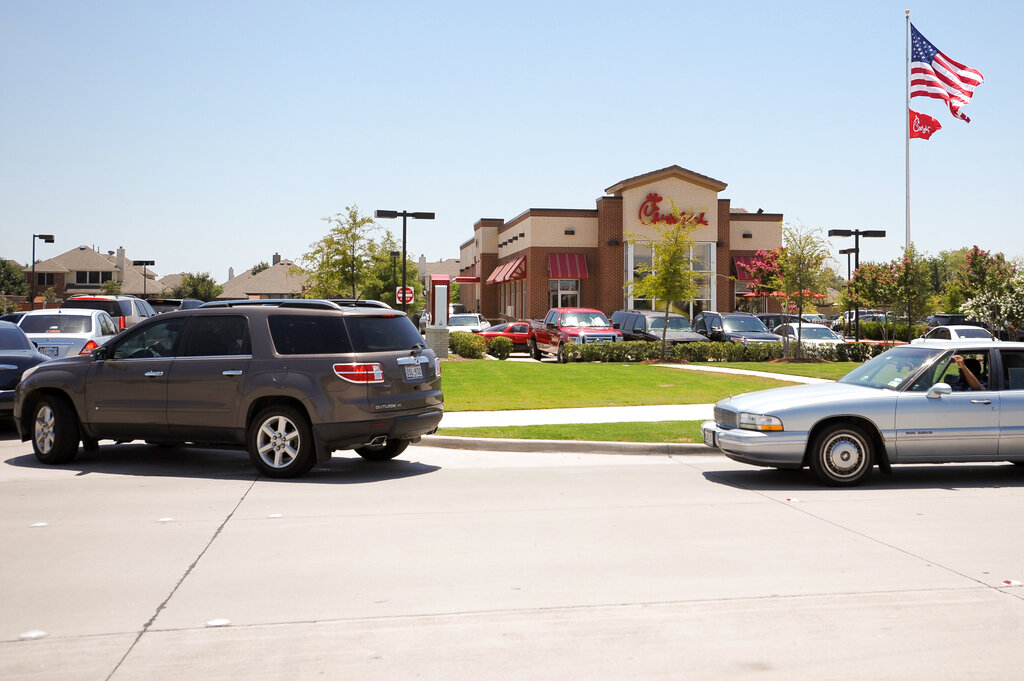In some colonies in early America, individuals could be stopped if they were traveling on Sundays other than in emergency situations or heading to church.
Today, such travel is common, with holiday weekends being particularly busy. Restrictions on Sunday travel would be considered to be an improper religious establishment.
Whereas many states operate rest stops for individuals to take a break, find out about tourist destinations, or use restrooms, some states, like New Jersey and New York with toll freeways place state-owned service stations, restrooms and eateries along the route so that travelers do not need to exit the freeways into cities or towns for food or drink.
Chick-fil-A’s purpose is “to glorify God”
Most franchise restaurants, including those at rest stops, are open seven days a week, thus accommodating those who might be stopping on Sundays. Chick-fil-A, a restaurant chain that specializes in chicken sandwiches, does not and has not since it opened its first restaurant in 1946. Indeed, in 2019, the restaurant had to withdraw its promotion of National Sandwich Day, which fell on a Sunday.
Well-known for the Christian faith of its owners, the franchise, which has contributed money to groups that opposed the expansion of LGBTQ legal protections including gay marriage, does not open on Sundays so that its employees can be with their families or can worship on that day. The firm’s corporate purpose is “to glorify God by being a faithful steward of all that is entrusted to us and to have a positive influence on all who come in contact with Chick-fil-A.”
N.Y. bill would require restaurants leasing government space to be open Sunday
Absent blue laws that limit the operation of certain businesses on Sundays, private franchises have every right to decide what day or days of the week they may be open. A Jewish-owned business might, for example, decide not to open on the Jewish sabbath (Saturday) or on special religious holidays.
This situation is somewhat complicated, however, when such franchises lease space owned by governmental entities. Chick-fil-A is among the businesses that lease space along the New York freeway. Although such stops lease to other restaurants that are open on this day and are presumably pleased to have the additional business, customers may be inconvenienced by having one less choice and by having to wait longer. Some New York legislators are accordingly pressing for legislation that would require any new businesses that receive leases at such highway rest stops (it does not apply to businesses that are already in place) to agree to stay open seven days a week.
Courts would consider First Amendment protections for Chick-fil-A
Courts are likely to look negatively on any decisions that are based on bias against a business for its political or religious views or practices, which are firmly protected by the First Amendment, but states certainly have an interest in seeing that those who travel are properly accommodated. This does not, however, mean that travelers are entitled to the restaurant of their choice, or to a restaurant with no lines, especially if they have the option of packing lunches or exiting a freeway to seek food elsewhere (closing all gas stations might prove to be a different matter).
Prior to the invention of the telegraph, which facilitated the spread of information related to commerce, the U.S. Congress adopted legislation that provided for Sunday mail, even though this impinged on rest or worship that Christians might have desired on that day.
Attempting to force individuals or businesses to work on Sunday or forfeit their jobs would certainly impact their free exercise of religion. If they chose to shut down rather than comply, this, in turn, would affect consumer choices at rest stops on the other six days of the week. Most Americans are presumably solicitous enough of the rights of individuals to practice their religion that legislation seeking to force non-emergency businesses to open on Sundays would be unlikely to pass.
SEE ALSO
FURTHER READING
- “Why is Chick-fil-A closed on Sundays” by Chrissy Callahan, TODAY, Aug. 18, 2023.
- “New York bill could force Chick-fil-A to break its long-standing policy to close Sundays” by Maysoonk Khan and The Associated Press, Fortune. Dec. 22, 20223.
- “NY lawmakers call out Chick-fil-A over Sunday closures at highway rest stops” by Tamara Staff, The Hill, Dec. 18, 2023.
- “Chick-fil-A sent an email promoting National Sandwich Day on Sunday. Did they forget they’re closed that day?” by Kelly Tyko, USA TODAY. Nov. 1, 2019.
- “Book Review: Examining the views of church and state in 5 ‘dissenting’ colonies” by John Vile, Nov. 7, 2023, First Amendment Encyclopedia.

